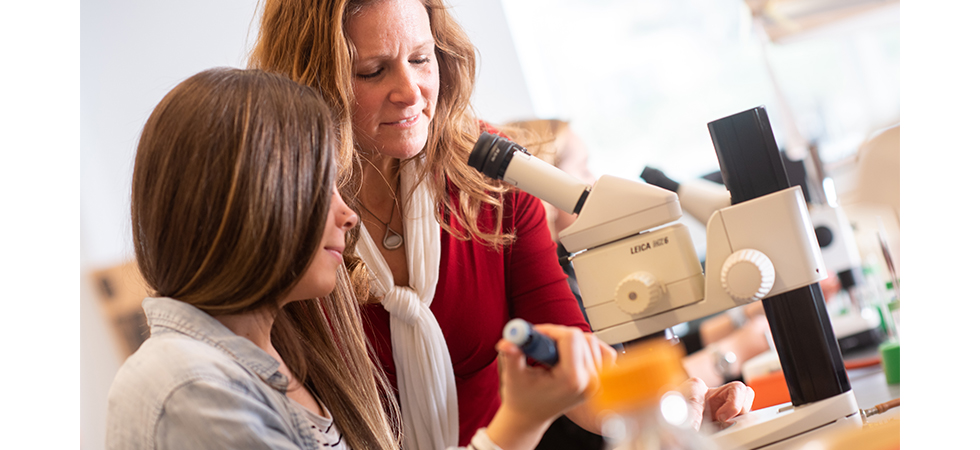NSF Grant Awarded to Assumption Professors to Transform Undergraduate Biology Education

Assumption Professors Sarah Rose Cavanagh, Ph.D., associate professor of psychology and associate director for grants and research for the D’Amour Center for Teaching Excellence, and Michele Lemons, Ph.D., professor of biology and director of the Center for Neuroscience, have been awarded a National Science Foundation (NSF) Incubator grant to form a Research Coordination Network in Undergraduate Biology Education (RCN-UBE).
According to the NSF website, the RCN-UBE program was created to promote positive changes in biology undergraduate education by advancing and creating “new directions in research or education by supporting groups of investigators to communicate and coordinate their research, training, and educational activities across disciplinary, organizational, geographic, and international boundaries.” With their grant, Profs. Lemons and Cavanagh will serve as co-principal investigators (PIs)—and joined by a steering committee and a set of participants—to develop their network, entitled Transforming Assessment, Feedback, and Grading in Undergraduate Biology Education, or TUnE-Bio.
“Our ultimate goal is to combat attrition and weed-out culture, and associated inequities, in undergraduate biology education by transforming current methods of assessment, feedback, and grading,” shared Prof. Cavanagh. “Leaders in the field of the scholarship of teaching and learning have proposed innovative new approaches to assessment and grading, but these innovations are often more suited for humanities classrooms than STEM ones. Biology instructors report multiple constraints to innovation, such as pressure to cover a high degree of content before students move on to other courses, and the specific demands of articulation agreements moving from two- to four-year programs.”
Prof. Cavanagh said there are many barriers and challenges in undergraduate biology education, for both students and faculty. Examples for students include the demotivating nature of low grades on high stakes exams; a “climate of intimidation” when it comes to difficult material; and a fixed mind-set of not being a “science person”; while faculty face the challenges of an overwhelming amount of content to cover; pressure of standardized exams such as the MCAT; institutional barriers such as lack of departmental support; a lack of awareness of options when starting something new; and little time to investigate and implement solutions.
“Our hopes are to tackle the ‘culture of intimidation’ reported by so many students in UBE, and thus to broaden participation of previously underrepresented students in these majors,” said Prof. Cavanagh.
In its incubator year, the grant will involve getting a “birds’ eye view of the current state of play in undergraduate biology education” and the team will conduct national surveys and focus groups about current practices and barriers to innovation. “Assumption will be one of the sites of this data collection, and it is also possible that students might become involved through independent studies working with me or Prof. Lemons,” said Prof. Cavanagh.
Prof. Cavanagh added that the TUnE-Bio Network “intentionally combines the expertise of scholars in undergraduate biology education, the scholarship of teaching and learning, and research design in order to brainstorm and test paths to progress.”
As the home base of this national network aimed at improving assessment, feedback, and grading in undergraduate biology education, Prof. Cavanagh hopes Assumption students will be the first beneficiaries of their findings. “In addition to our national dissemination plans through conference presentations and publications, we will certainly share insights gained through this work directly with Assumption faculty through D’Amour Center for Teaching Excellence programming,” she added.
Follow the team’s progress on Twitter at @tune_bio.
